What happened to Gus Poyet’s first Brighton line up?
November 15th 2009 was a watershed moment in the history of the Albion. On that Sunday afternoon away at Southampton, Gus Poyet took charge of Brighton for the first time. From that point on, things would never be the same again.
Over the next three-and-a-half years, Poyet would go onto revolutionise the Albion on the pitch. Under his management, we went from perennial third tier strugglers to a side knocking on the door of the Premier League.
All that was done with an identity and a modern approach to the game the likes of which we’d never seen before. At times, the Albion’s football was on another planet compared to their opponents, which is why the 2010-11 League One title winning season remains many fans’ favourite ever campaign.
The Poyet Era began as it would go on. Struggling Brighton went along to the South Coast to St Mary’s to take on a quality Saints side. Alan Pardew’s charges would go onto win the Paint Pot and finish in seventh spot on 73 points come the end of the campaign – despite starting on minus 10 after slipping into administration the previous season.
The hosts had no answer to Poyet’s Albion though. Brighton wound up deserved 3-1 winners to give a packed away end littered with Uruguay flags in tribute to the new man at the helm hope for what the future might hold.
Poyet used 14 players to beat the Saints that day, many of whom would be gone by the end of the season such was the startling rate of change which he oversaw. Here’s what happened to the individuals who gave Poyet the perfect start to his reign as Brighton boss.
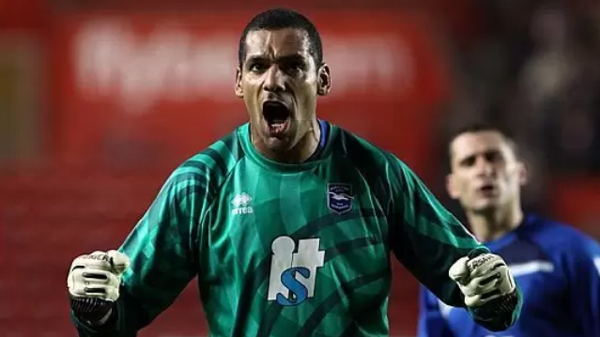
Michel Kuipers
One of the most memorable images from Poyet’s first game in charge was the photo taken of Michel Kuipers when Andrew Crofts smashed in the Albion’s third. The Former Dutch Marine was on his knees in front of the Chapel Stand, arms outstretched and looking up to the sky as if he’d just discovered God.
That turned out to be one of the last contributions Kuipers made in an Albion shirt. Within a month of Poyet’s arrival, the new manager moved to bring in Peter Breozvan as a goalkeeper more in keeping with his desire to play out from the back. By the end of the season, the Sexy Slovak had established himself as number one as Kuipers was released after 10 years and 287 appearances.
Kuipers went onto help Creepy Crawley to promotion to the Football League and now works as an agent, with one of his clients being a certain Jurgen Locadia. As a result, we used to frequently spot Kuipers at away games where he would shun the prawn sandwiches on offer in favour of coming in the away end with the Albion support. We even had to ask him what had happened for Palace’s equaliser at Selhurst Park back in March as we’d missed it otherwise engaged with several bottles of half time Carlsberg. He didn’t have a clue, either.
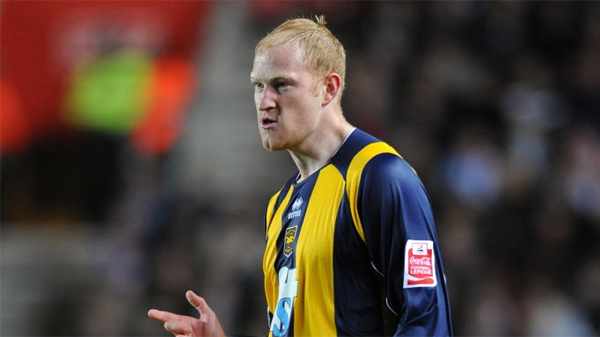
Andy Whing
Six months before Poyet’s arrival, Andy Whing had been an overwhelming winner of the Albion’s 2008-09 Player of the Season. This was partly because the club had decided to implement a new rule whereby players could only be eligible for the award if they’d played over a certain number of games in order to prevent the embarrassment of Lloyd Owusu or Gary Hart winning after just a handful of appearances.
It was also partly because Whing seemed to be the only player who gave a toss that we might end up relegated to League Two. That pretty much summed the him up – he was never the most talented of individuals but he’d run through a brick wall for the team.
Unfortunately, that was never going to be enough for Poyet’s style of football. After the Southampton game, Whing made just three more appearances for the Albion as first Gavin Hoyte and then new signing Inigo Calderon took over at right back. Whing subsequently played for Chesterfield, Leyton Orient and Oxford United and is currently working as assistant manager to Russell Slade at Hereford United.
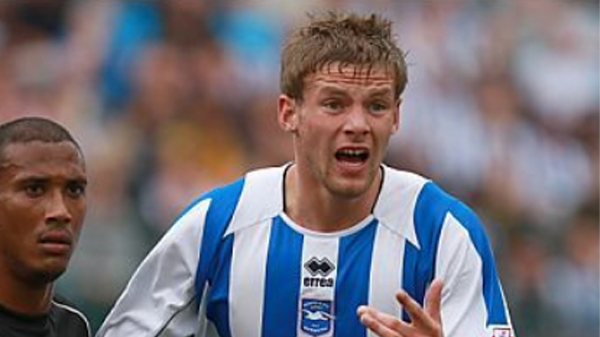
James Tunnicliffe
Towering centre back James Tunnicliffe was one of the 27 signings that the Albion made from Stockport County over the course of 2009. He cost a reported £250,000, which proved to be a spectacularly bad use of money given that he played just 20 times for the club. In that time, the only things we can recall him doing are scoring away at Bristol Rovers and having a really big throw.
Poyet gave Tunnicliffe nine of those appearances before sending him on loan to MK Dons and Bristol Rovers. He was released to join Wycombe Wanderers in the summer of 2011 and has since played for Crewe and Stalybridge Celtic as well as returning to Edgeley Park for a two year spell.
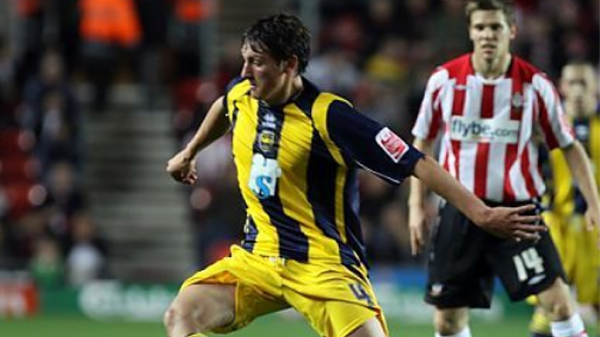
Tommy Elphick
One of the few players to start Poyet’s first game who could go onto play a significant role under the Uruguayan, Tommy Elphick was an important part of the back four who lifted the League One title 18 months later. He made 35 appearances as part of that successful 2010-11 side, no mean feat given that he was battling with Gordon Greer and Adam El-Abd for a spot at centre back.
It was in the final game of that campaign that his Albion career sadly came to a premature end. Elphick was stretchered off with a serious knee injury in the 1-1 draw at Notts County and by the time he returned 14 months later, an emerging talent by the name of Lewis Dunk had overtaken him in the pecking order.
Needing to play regular first team football, Poyet agreed to sell Elphick to Plucky Little Bournemouth. That turned out to be a good move as he captained the Cherries from League One to the Premier League. Elphick can now be found at Huddersfield Town having also played for Aston Villa, Reading and Hull City.
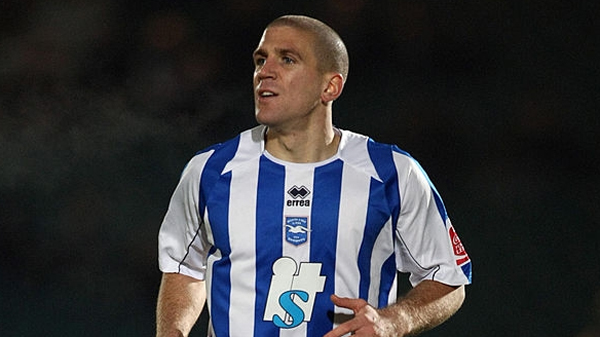
Adam El-Abd
More than a few eyebrows were raised when, within a couple of months of his appointment, Poyet came out and said that Adam El-Abd was the best defender at the club.
Was Poyet on drugs? At this point in his career, El-Abd had carved out a reputation as a player who could do a job kicking people at right back, a player who could do a job kicking people at left back or a player who could do a job kicking people in central midfield. Oh, and he was also good for one calamitous back pass a month which would gift whoever the lucky opponents were that day a goal.
El-Abd didn’t really have a strongest position, a point proven by the fact he started Poyet’s first game in charge at left back. He was a jack of all trades but master of none, which is why many Albion fans were left scratching their heads at Poyet’s proclamation.
Well, what did we know? Turned out that Poyet was right. El-Abd’s transformation into a ball-playing centre half under the new manager was phenomenal and arguably Poyet’s greatest achievement as Albion boss. The result was El-Abd going onto be crowned Player of the Season come the end of the 2010-11 campaign; no mean feat given the quality in that squad that year.
He became a full Egyptian international and one of the most popular players ever to come through the Albion youth ranks. It was a sad day when he eventually left the Amex in January 2014 after 342 games, going onto play for Bristol City, Bury, Swindon Town, Gillingham, Shrewsbury Town, Wycome Wanderers and Stevenage where he currently resides.
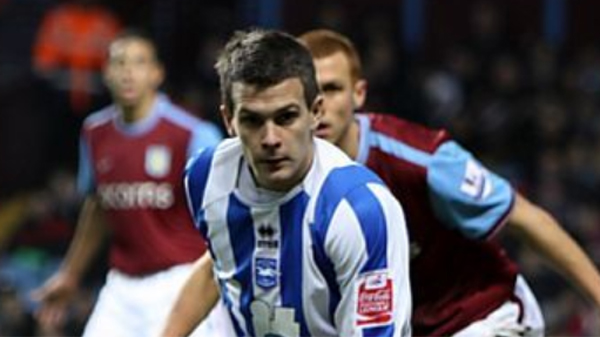
Dean Cox
Dean Cox was the man who set up the first goal of the Poyet era, his superb cross from the right wing being met by an even better controlled volley from Glenn Murray with just 15 minutes played. It looked then like Cox could thrive under the tutelage of the new manager but fast forward three months to a 1-0 home defeat to Millwall on January 30th and he was playing the last of his 179 games for the Albion.
Cox was told with three weeks of the 2009-10 season still to be played that he wouldn’t have his contract renewed as Poyet clearly didn’t see eye-to-eye with the diminutive winger. He went onto sign for Leyton Orient that summer, becoming an integral part of Russell Slade’s side who came so close to bringing Championship football to Brisbane Road a few years later.
Cox has since gone onto play for Creepy Crawley and Eastbourne Borough. He will always be a favourite of the team here at WeAreBrighton.com Towers, although that opinion may be strongly influenced by his liking of buying Jagerbombs for complete strangers in Savannah Cafe Bar in Haywards Heath.
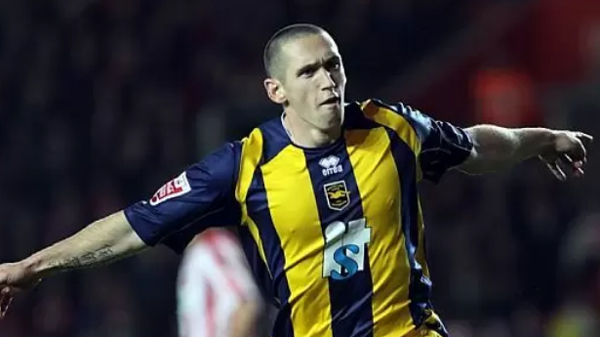
Andrew Crofts
One of Poyet’s first moves as Albion boss was to hand Crofts the captaincy. Crofts duly responded by marking his first game with the armband with the third goal at St Mary’s, one of seven he would manage in total under Poyet’s management. That form over the next six months of the campaign ensured that he was voted as Player of the Year come the end of the season.
As a result, Norwich City came calling and so Crofts was off to Carrow Road for £250,000, not a bad return on a player who Slade had picked up on a free transfer from Gillingham a year earlier. He helped the Canaries to promotion to the Premier League before returning to the Amex in 2012, leaving again in 2015 and then coming back for a third spell in the summer as a specialist player for Simon Rusk’s Under 23 squad – despite the fact that he is now 35. Work that one out.
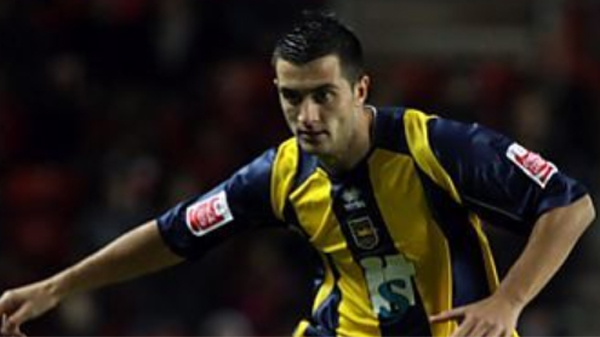
Gary Dicker
Another player brought in from Stockport, Dicker was one of the more successful of the Edgeley Park contingent to rock up at the Albion as he went onto play 144 times for the club. The control he offered in the centre of midfield had been crucial to Slade’s Great Escape from relegation the previous season and that trait was always likely to make him a player who would appeal to Poyet.
So it proved as Dicker was a regular under the Uruguayan for the first three years of his management. It was only when the likes of Andrea Orlandi and David Lopez arrived in the summer of 2012 that Dicker found his first team opportunities limited and he eventually left the club at the end of the 2012-13 campaign.
Spells with Rochdale, Crawley and Carlisle United followed before Dicker headed north of the border with Kilmarnock where he is still an Scottish Pub League regular at the sprightly age of 33.
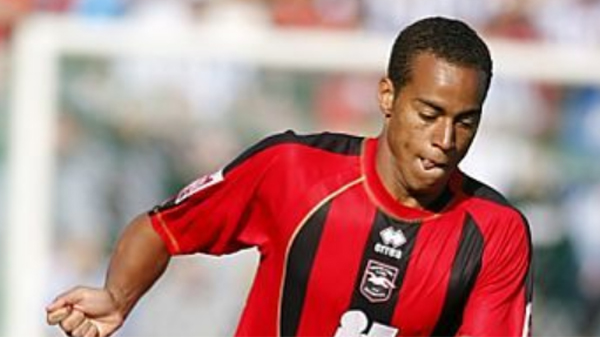
Elliott Bennett
One of the most frequently heard shouts from the Withdean dugout during Poyet’s time in charge was “ELLIOTT, ELLIOTT” in a strong Uruguayan accent. Why Poyet shouted so much at Elliott Bennett goodness knows, because the winger was one of the star performers right from the moment that Poyet breezed into Brighton.
He ended the 2009-10 season with nine goals from the wing and was even more dazzling in the following year’s title winning campaign, netting eight and registering over 20 assists for that ridiculous forward trio of Murray, Ashley Barnes and Chris Wood.
Bennett even managed to survive handing in a transfer request. Whilst agitating for a move often results in a complete breakdown in the relationship between player and supporters, Bennett was so popular with the Albion faithful that even after he failed to get his £1.5m transfer to Norwich pushed through, he was treated like a hero.
For his part, he duly knuckled down, helped secure promotion and then went to Norwich that summer. He came back to Brighton on loan for a brief spell in the 2014-15 season and has spent the past four seasons with Blackburn Rovers.
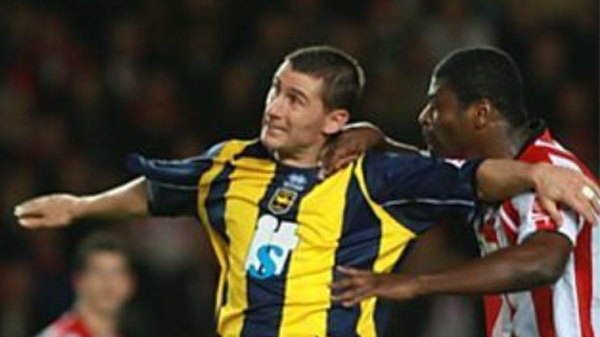
Nicky Forster
For two seasons prior to Poyet’s arrival, Nicky Forster had been Brighton’s main man. The veteran striker was chief goalscorer, captain and a huge personality in the changing room – which ultimately led to him clashing with an even bigger personality in the new boss.
Forster scored six times in 18 games under Poyet but even that wasn’t enough to save his Albion career. Forster’s final Brighton appearance came in a 3-0 home win over Brentford. He scored of course, celebrating emotionally in front of a South Stand, many of whom weren’t too impressed with the fact that Poyet was actively trying to get rid of our top scorer – especially as some unknown, young striker from Plymouth Argyle called Ashley Barnes was being lined up as a replacement.
Within a couple of days of that goal against the Bees, Forster was a Charlton Athletic player. He helped the Addicks to the League One play offs before moving to Brentford in the summer of 2010, going onto have a brief spell as manager at Griffin Park. According to LinkedIn, Forster now works in the media for Sky Sports and The Football League Paper and as an insurance salesman providing products to the football and high net worth market.
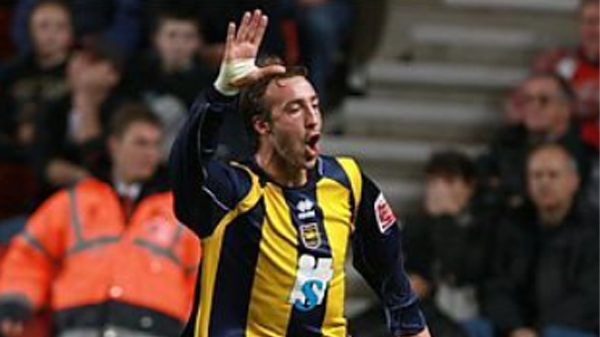
Glenn Murray
Murray’s two goals against Southampton got the Poyet Era started with a bang. It also kicked off a fascinating personal relationship between manager and player. Most managers love the striker who gets the goals; after all, bosses live and die by results and if you’ve got a centre forward who is consistently putting the ball in the back of the net, then chances are you are going to be a more successful manager.
Yet Poyet never took to Murray. He spent most of the summer of 2010 trying to sign Billy Paynter as a replacement. 22 goals and a League One title later and Poyet still didn’t rate Murray highly enough to consider him worthy of the modest pay rise he was undoubtedly entitled to. As a result, Poyet was happy to see his top scorer walk out on a free – to Crystal Palace of all teams.
Football is full of “What ifs”, and one of the biggest in Brighton’s history must be what if Poyet had kept Murray? What if Murray hadn’t spent five years away from the Albion, firing Palace to promotion and then banging in goals for Reading and Bournemouth?
He almost certainly would be streaks ahead of Tommy Cook’s record of 123 goals for the club. As a result, he’d rightly be considered one of the greatest players we’ve ever had. And we’d probably have made the Premier League much sooner than we eventually did.
For all the good that Poyet did, his undervaluing of Murray will always remain a major blot on his copybook. He should’ve realised when Murray bagged that brilliant brace on day one at St Mary’s what a talent he had on his hands.
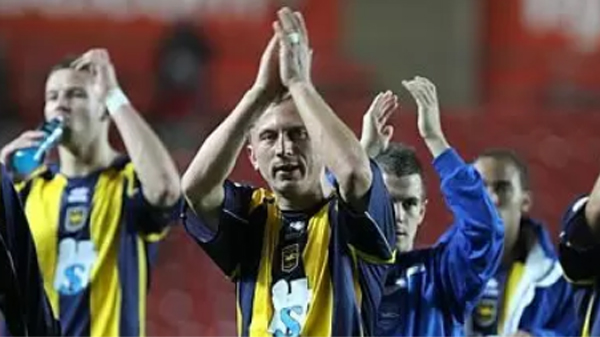
Gary Hart (Cox 60)
Oh Gary Hart. The popular forward had enjoyed something of an Indian summer towards the end of the previous season when he formed a surprisingly deadly strike force with Owusu that somehow kept the Albion in League One.
Most thought his days at the club would be over come the summer of 2010 after he failed to start a single game under Poyet, but the Uruguayan had taken a real shine to the veteran forward and surprised everyone by offering him a new one-year deal for the 2010-11 season.
Hart started in cup matches against Northampton Town, Woking and FC United of Manchester that year and made a further six appearances from the bench, including an emotional farewell in the final game at Withdean when Poyet gave him 25 minutes in the 3-2 defeat to Huddersfield.
So much did Poyet like Hart that he even invited him back to play in the first game at the Amex when the Albion’s Under 21s defeated Eastbourne Borough to win the Sussex Senior Cup. Naturally, Hart scored the first goal in the new stadium in what was his final appearance in the stripes after 417 competitive appearances over the course of 13 years.
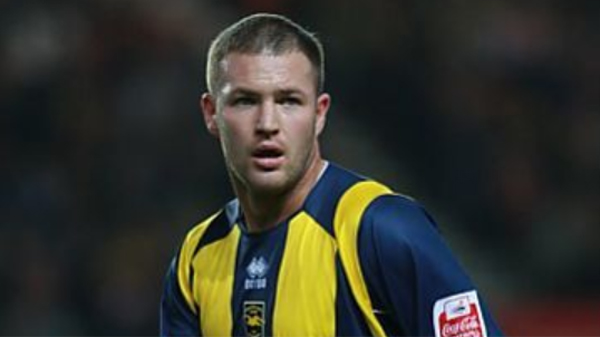
Alan Navarro (Bennett 75)
Before Poyet’s arrival, Alan Navarro was a player who was criminally underrated by Brighton supporters. The midfielder had been signed on a free from MK Dons but a neat passing game and the ability to break up play didn’t really seem to fit in with Slade’s style of football. As a result, many Albion fans bemoaned him as being too slow and unfit to be a professional footballer.
Poyet though had other ideas. Navarro very quickly became one of the first names on the team sheet under the new boss and in a side which passed the ball as much as the new-look Albion did, he was invaluable. It looked like Navarro would be set for a big 2010-11 campaign in the heart of midfield until he ruptured his cruciate knee ligament in the second game of the season, a League Cup tie away at Northampton Town.
He battled back from that, even managing to earn a new one-year deal for the 2011-12 campaign. That made him one of the more popular players among supporters and he underlined the fact by scoring one of the most memorable goals of the past 10 years with a last minute winner away at Leeds in February 2012, the only time in fact he netted in Brighton colours.
With Poyet and the Albion aiming for Premier League football, Navarro was one of the stalwarts who was sadly cast aside and he joined Swindon Town in the summer of 2012. His first game for the Robins wound up being against the Albion in the League Cup, a match in which he scored twice for his new club – meaning that he had more goals against Brighton in 75 minutes as a Swindon player than he’d managed for the Albion in 85 appearances.
Navarro can mostly be found these days entertaining the masses on Twitter by talking about Paul Di Canio’s time in charge at the County Ground and revelling in Liverpool’s recent success under Jurgen Klopp. Lord knows how happy he’ll be if the Reds don’t blow the Premier League title this season.
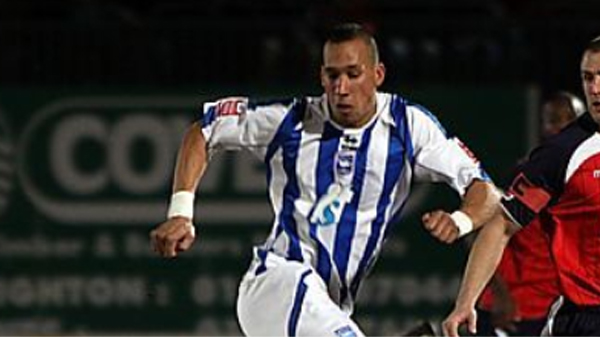
Liam Dickinson (Forster 75)
Liam Dickinson. Comatose girl. 1am on a Tuesday morning. Carnage Pub Crawl. We don’t need to say any more.




